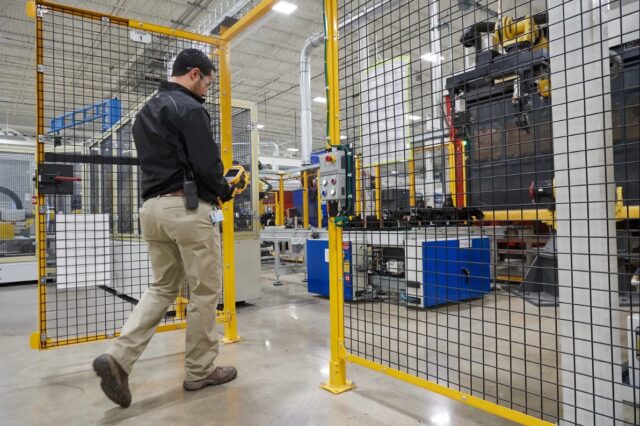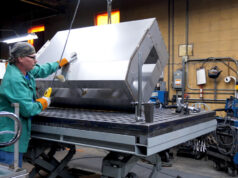
Regarding electrical safety in the workplace, knowledge of the National Fire Protection Association’s 70e standard is paramount. This document is essential for adhering to safety regulations and minimizing hazards within a given work environment.
Equipping yourself with this understanding is heavily emphasized by the NFPA, and employers should make sure all employees have a clear grasp on short circuit protection, correct use of surge-suppression devices, hazard assessment policies, and more.
All personnel must be trained on adequately handling these issues according to the authorities’ industry best practices. Those trained correctly shall always exercise due diligence when dealing with electricity, just as they do everything else that puts their health or those around them at risk. Without this framework in place, companies risk facing the consequences stemming from disabling incidents, fines, or employee lawsuits down the road.
This comprehensive safety standard protects workers from electrical hazards, including shock, arc flash, and arc blast. But how can you determine if an NFPA 70e certification course benefits you? Let’s delve into the details.
What is NFPA 70e?

Before we explore the benefits of certification, let’s clarify what NFPA 70e is. The NFPA 70e, also known as the Standard for Electrical Safety in the Workplace, is a set of guidelines established by the National Fire Protection Association. These guidelines provide practical instruction for safeguarding employees from electrical hazards while working.
Why does certification matter?
One main advantage of an NFPA 70e certification is enhancing your safety knowledge. The course provides in-depth instruction on identifying, evaluating, and mitigating electrical risks in the workplace. This knowledge is invaluable for anyone working around electricity, whether an electrician, engineer, safety manager, or maintenance personnel.
The U.S. Department of Labor’s Occupational Safety and Health Administration (OSHA) mandates that employers equip their employees with the knowledge to identify and circumvent hazardous situations. Attaining an NFPA 70e certification fulfills this directive, offering a thorough comprehension of the NFPA 70e guidelines. Frequently, OSHA utilizes this standard as a reference during workplace assessments for adherence to electrical safety regulations.
Having an NFPA 70e certification can enhance your career prospects in many industries. Employers often prefer candidates who have demonstrated their commitment to safety by investing in their education and training. Furthermore, some job roles may even require this certification as a prerequisite.
Who should consider NFPA 70e certification?
Electrical workers like electricians and engineers are the most obvious candidates for an NFPA 70e certification course. They are regularly exposed to electrical hazards, making this training essential for their safety.
Safety managers are responsible for ensuring workplace safety. To fulfill their role effectively, they need a thorough understanding of various safety standards, including NFPA 70e. Therefore, safety managers can significantly benefit from this certification.
Maintenance personnel often work around electrical equipment, even if not directly dealing with electrical systems. Thus, an NFPA 70e certification can help them understand the potential hazards and follow safe work practices.
What’s a qualified person according to the NFPA 70E?

A qualified individual possesses the expertise and knowledge required to construct and operate equipment or specific work methods. They are also trained to identify potential hazards. In addition, such individuals are familiar with precautionary techniques, personal protective equipment, and insulating and shielding materials. They are skilled in using insulated tools and test equipment. It is important to note that a person may be considered qualified in specific standards and methods while being unqualified in others.
For what should a qualified person be trained for?
In the electrical industry, qualified individuals must receive training in the skills and techniques necessary to distinguish live parts from non-live parts of electric equipment. Additionally, these individuals need to know how to determine the voltage of exposed live parts and understand the minimum distances they need to maintain to stay safe.
Making informed decisions about the degree and extent of the hazard is also critical, as it helps determine the appropriate personal protective equipment and job planning necessary to perform the task safely. All of these components come together to ensure that qualified individuals are equipped to handle any electrical situation with the utmost care and attention to safety.
What are the benefits of annual training?
Annual training is crucial for anyone concerned with safety and health in the workplace. It provides numerous benefits for a safer work environment for everyone involved. One of the most significant advantages is increased awareness of hazards.
Personnel with adequate training are more skilled in identifying and reducing possible hazards before they occur. Moreover, they understand safety measures and procedures, empowering them to react swiftly and effectively under risky circumstances.
Improved risk assessment skills and enhanced protective measures are other benefits of regular training, further bolstering its importance. But perhaps most crucially, training ensures compliance with regulations to avoid potentially costly penalties and lawsuits. In short, annual training is an essential investment in workplace safety that benefits everyone.
In which situations should a qualified worker receive additional training?

It’s widely understood that maintaining a safe working environment is paramount. If staff members fail to adhere to safety protocols as directed by their line manager or identified in yearly assessments, they must undertake further instruction.
Moreover, if new technologies, tools, or procedure changes call for implementing unfamiliar safety-related work practices, supplementary training becomes essential to guarantee employee safety.
Finally, safety-related practices not generally used during regular job duties may need to be implemented in some job situations, again requiring additional training. By providing this extra training, we can ensure our employees’ safety and prevent accidents.
Find Out If You Can Benefit From A NFPA 70e Certification Course – In Conclusion
An NFPA 70e certification course can benefit anyone working around electricity. It enhances safety knowledge, ensures compliance with OSHA standards, and boosts career prospects. Moreover, it helps electrical workers, safety managers, and maintenance personnel. So, if you’re in one of these roles or plan to be, consider investing in an NFPA 70e certification course. The knowledge you gain could potentially save lives, including your own.







